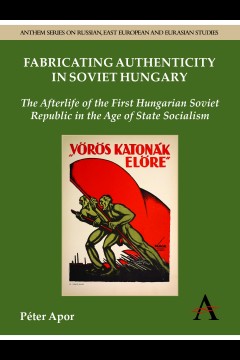Fabricating Authenticity in Soviet Hungary
The Afterlife of the First Hungarian Soviet Republic in the Age of State Socialism
By Péter Apor
Anthem Series on Russian, East European and Eurasian Studies
- About This Book
- Reviews
- Author Information
- Series
- Table of Contents
- Links
- Podcasts
About This Book
How do you make abstract historical interpretations authentic? This question troubled communist party leaders and propaganda historians in Hungary following the restoration of dictatorship after 1956. Accordingly, this book investigates the crooked history of the retrospective state revisions of the First Hungarian Soviet Republic between the years of its 30th and 40th anniversary, 1949 and 1959.
In recent decades the study of memory has become central to the historical discipline as a powerful conceptual tool to assess both the political-ideological implications of social constructions of the past and the writing of history itself. Yet, most of these investigations focus on postdictatorial situations, and suggest ways to understand how these societies confront their controversial and often traumatic pasts. In this volume, Péter Apor takes an in-depth look at a particular phenomenon – the First Hungarian Soviet Republic of 1919 – to illustrate how a dictatorship and a communist state remembers. Unlike other works analysing social memory, this book concentrates on authenticity as the crucial concept in establishing the success or failure of memory constructions, integrating the broad range of processes – political, scholarly, artistic – through which history is sought to be rendered authentic.
Reviews
‘Péter Apor offers innovative, theoretically grounded interpretations of the Communist memory politics. This book is an important work on the history of East European Communism.’ —Gábor Gyáni, Research Professor, Institute of History, Hungarian Academy of Sciences, and Visiting Professor, Central European University
‘The memory of the Communist past is a major issue today – Péter Apor reverses the question and reminds us how the Communists themselves distorted national memories. This original book offers a good example of how to deconstruct these sophisticated policies of history.’ —Henry Rousso, Senior Researcher, Institut d’histoire du temps présent, French National Centre for Scientific Research (CNRS)
‘“Fabricating Authenticity in Soviet Hungary” follows the intricate thread of the long afterlife of a short but deeply controversial historical event. The book forcefully argues that under the condition of politically induced retrospective uncertainty, all historical facts become suspect of fabrication.’ —István Rév, Professor of History, Central European University
Author Information
Péter Apor is a research fellow at the Institute of History in the Hungarian Academy of Sciences, Budapest.
Series
Anthem Series on Russian, East European and Eurasian Studies
Table of Contents
Acknowledgements; List of Illustrations; List of Abbreviations; Introduction; Chapter 1: Prefiguration: The First Hungarian Soviet Republic and the Rákosi Dictatorship before 1956; Chapter 2: Resurrection: The Emergence of 1919 and the Counterrevolution after 1956; Chapter 3: Lives: 1919 in the Postwar Trials of War Criminals; Chapter 4: Funeral: The Birth of the Pantheon of the Labour Movement in Budapest; Chapter 5: Narration: History, Fiction and Proof in the Representation of the First Hungarian Soviet Republic, 1959–65; Epilogue: The Agitators and the Armoured Train; Index
Links
Stay Updated
Information
Latest Tweets



